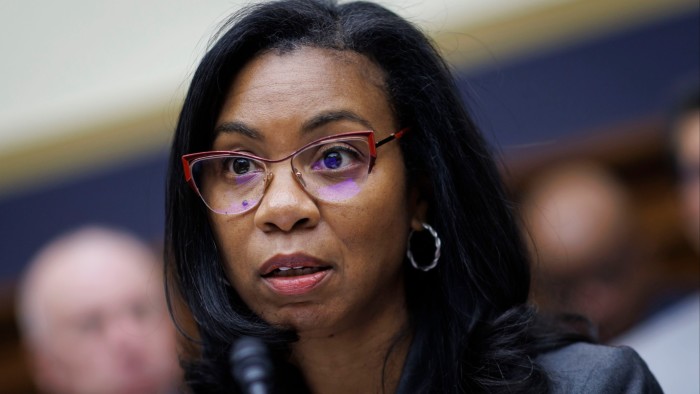Stay informed with free updates
Simply sign up to the US financial regulation myFT Digest — delivered directly to your inbox.
A Republican plan to abolish the US regulator that oversees accounting firms risks damaging audit quality not just in America but around the world, according to the organisation’s chair.
Erica Williams, head of the Public Company Accounting Oversight Board since 2022, said in an interview with the Financial Times that the plan would upend international agreements that allow US inspectors to examine audit firms in countries from China to the EU.
The PCAOB was set up to oversee auditors of US-listed companies, regardless of where the auditor is based, and sends inspectors around the world to carry out regular examinations and enforce standards.
Of 1,519 audit firms registered with the regulator, 844 are non-US firms, and in the past two years, it has levied penalties on firms from countries including the Netherlands, Indonesia, Australia and Japan.
“I believe that our inspections programme is one of the models of the world,” Williams said in the interview. “In jurisdictions where we have gone in for the first time and inspected firms, oftentimes you see very high deficiency rates, for example in China and Hong Kong now. Research studies show the PCAOB inspections improve audit quality at these firms as they are inspected over and over again.”
Republicans have proposed folding the PCAOB’s responsibilities into the Securities and Exchange Commission as part of President Donald Trump’s deregulatory agenda. While PCAOB employees could be given the chance to transfer their roles to the SEC, they would in many cases have to take pay cuts as the organisation is not subject to government pay scales.
Draft legislation published on Friday and approved by the House committee on financial services on Wednesday would end the levy on public companies and audit firms that funds the PCAOB’s near-$400mn annual budget.
Williams said the SEC would have to hire “hundreds of additional people” to take on the PCAOB’s responsibilities, and “negotiate agreements with jurisdictions around the world” to replace the current set of deals that allow international inspections.
Those agreements took years to set up, and China only allowed inspectors in for the first time in 2022 after Congress threatened to delist Chinese companies from US exchanges.
In a letter sent earlier this week to Democratic members of the financial services committee, Williams argued that “the ability to protect investors in Chinese companies would, at a minimum, be significantly disrupted”. She told the FT that Republican committee members had not consulted the PCAOB before writing the draft legislation, which has been submitted for inclusion in the giant tax and spending bill currently under discussion in Congress.
Williams’ leadership of the PCAOB has been characterised by increased friction with the audit profession. Its inspectors identified significantly more deficiencies in US company audits, its enforcement division levied record fines, and big firms say its standards setters toughened rules without taking the profession’s views properly into account.
Asked if the increased friction could have contributed to Republicans’ antipathy to the agency, Williams declined to comment, but said her efforts had borne fruit.
“When we got here, deficiency rates were not where we need them to be. They were increasing. And this last year, with our 2024 inspection results, we saw significant drops across all firms,” she said.
The plan to abolish the PCAOB faces several procedural hurdles before it can become law. Whether it will be included in the tax and spending bill, known as a reconciliation bill, will depend on negotiations within the Republican leadership in the House and Senate and whether it is deemed a budgetary measure.
It is also yet to be “scored” by the Congressional Budget Office, which will rule on the budgetary impact.
In a letter to the financial services committee, a group of former PCAOB advisers said the proposal was “a cynical ploy of bill sponsors to present this as a deficit-reduction measure” because the PCAOB is in fact funded independently of taxpayers while the legislation would pile new costs on to the SEC.
Williams said the PCAOB “stands ready” to provide assistance to the CBO for its analysis.



